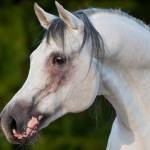Genetic Testing in Horses: Out with the Old?

Genetic testing, like many areas of equine medicine, has grown at a remarkable pace. Consider, for example, that genetic tests for many diseases are now available and that a complete map of the equine genome occurred in 2007. Not only did these medical advances help improve the health of individual horses and the vigor of breeding programs, but progress in genetic research also paved the way for new technologies. Now, instead of testing for only one or a handful of genetic diseases, owners can screen 99 genes using a single DNA sample and contribute to the “discovery” of new genetic aberrations in horses without breaking the bank.
“The traditional 3- and 5-panel tests required for registering Arabians and Quarter Horses, respectively, have made a significant contribution to preserving the health and integrity of these breeds; however, despite being effective, those tests are somewhat antiquated and can be expensive,” noted Kathleen Crandell, Ph.D., a Kentucky Equine Research (KER) consultant.
New genetic platforms allow owners to test dozens of genes at once at a fraction of the cost. In addition to the standard genetic tests and panels, newer technologies are capable of analyzing an array of coat colors or patterns, health parameters, and even behavior traits simultaneously.
In addition, these new platforms also help “discover” new genes that affect health. A California-based company, Etalon Diagnostics, currently has several genes in discovery mode, including lordosis (swayback), risk for West Nile virus, and impaired acrosomal reaction that negatively affects fertility.
These technologies also facilitate the identification of important genes that contribute to the development of myriad other conditions, including inflammatory airway disease and developmental orthopedic diseases, to name only a few.
“Further, performance genes can also help identify ideal sports or athletic events that a particular horse is destined to excel at,” suggested Crandell.
This latter aspect of genetic testing could contribute greatly to minimizing equine wastage due to poor performance and identifying second careers for others.
“It is important to note that genetic research, despite its continued growth in popularity, is still in its infancy and that many conditions are a result of both genetic and environmental factors, including diet,” reminded Crandell.
To ensure your horse’s diet supports optimal health and performance from birth and beyond, consult with an equine nutritionist today.








